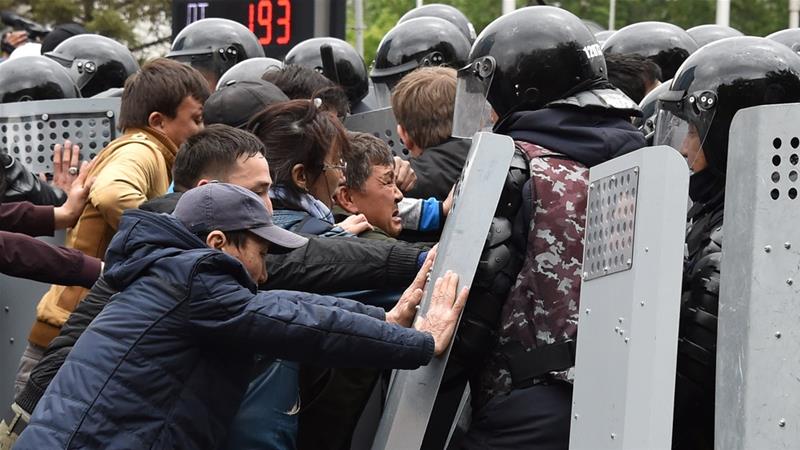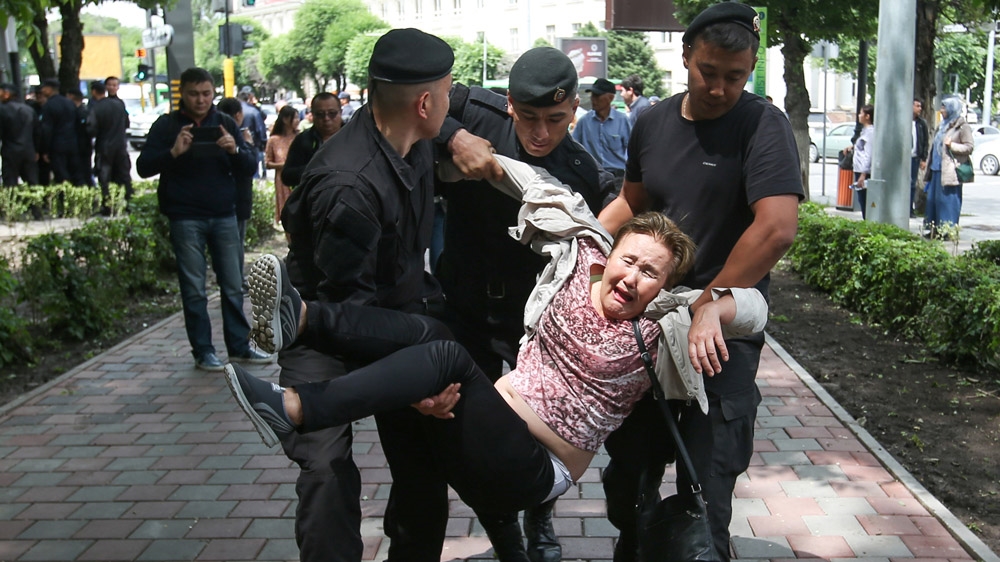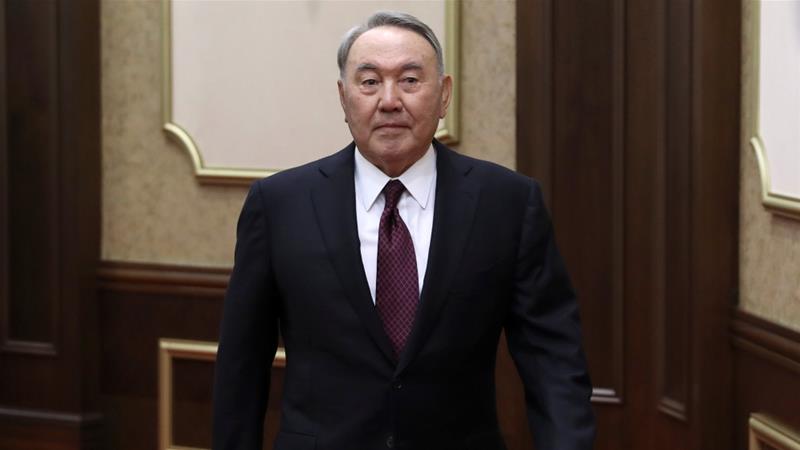Kazakhstan: Nazarbayev protege wins presidency, hundreds arrested
At least 500 people have been arrested for protesting against polls, which saw Kassym-Jomart Tokayev become president.
Kazakhstan has elected interim leader Kassym-Jomart Tokayev as the country’s first new president in three decades, according to election officials.
The hand-picked successor of former longtime leader Nursultan Nazarbayev, Tokayev took nearly 71 percent of the vote with all ballots counted, the Central Election Commission said on Monday, recording a turnout of more than 75 percent.
Nazarbayev had led the country since it gained independence from the Soviet Union in 1991 and was widely expected to rule until his death. He appointed Tokayev as acting president following his shock resignation in March.
Having received Nazarbayev’s blessing, Tokayev’s victory in Sunday’s ballot was all but assured. Amirzhan Kosanov, the 66-year-old career diplomat’s closest rival, took a mere 16.2 percent vote.
Not foreseen, however, were large protests in the capital Nur-Sultan and Almaty, the country’s main commercial city, on Sunday which led to the arrest of at least 500 demonstrators, according to the Ministry of Internal Affairs.
The protesters were calling for a boycott of the snap election, which they allege was staged to ensure Tokayev won, and did not offer a genuine choice to voters.
Among the seven candidates, only Kosanov was considered to be openly in opposition to the ruling Radiant Fatherland party.
“The election isn’t fair, it’s all been decided already,” a demonstrator told Al Jazeera, while another called the vote a “circus”, saying it did not offer a “legitimate choice”.
Al Jazeera’s Robin Forestier-Walker, reporting from the protest sites in Nur-Sultan, described individuals being “grabbed” and “seized” by police during the demonstrations.
“I’m not afraid because I’ve had enough. I’ve been living without a home in temporary accommodation for 13 years. I’m fed up,” another protester told Al Jazeera, her back pressed against a riot shield.
Tokayev urges restraint
Unsanctioned protests are illegal in Kazakhstan, where freedom of expression and assembly are restricted.
In the run-up to the vote, the crackdown on opposition intensified, with courts sentencing protesters to short stays in jail and the police raiding the homes of activists.
A number of journalists were also detained along with a representative of the rights NGO Norwegian Helsinki Committee. They were later released.
Despite large protests in previous years over wages in the oil sector and encroaching Chinese influence, Helene Thibault, an assistant professor at Nazarbayev University in Nur-Sultan, told Al Jazeera that Sunday’s protests were “unprecedented” in challenging “elections and the fundamentals of the Kazakhstani political system”.
The fact that the protests took place in several cities and included people from different social groups within Kazakhstan was also significant, Thibault said.
The scenes of clashes between protesters and police contrasted sharply with the government’s narrative of a peaceful transition of power.
Responding to a question from Al Jazeera during a news conference, Tokayev said he had advised law enforcement agencies to be “tolerant and to exercise restraint” with protesters, but added that any serious violations of Kazakhstan’s laws “would not be tolerated”.
“At the same time, I urge all the young people to exercise restraint, to be tolerant to the power, to the government,” Tokayev said.
Allegations of fraud
No Kazakh vote has ever been recognised as fully democratic by the Organisation for Security and Cooperation in Europe (OSCE), which had sent more than 300 observers to monitor the election.
The observers said that Sunday’s vote showed “a lack of respect for fundamental rights, including detentions of peaceful protesters, and widespread irregularities on election day”, adding that there had been “scant respect for democratic standards.
They concluded that an “honest count could not be guaranteed”.
Forestier-Walker reported having seen videos that appeared to show ballot stuffing and results being altered at some polling stations.
Addressing these concerns, Iskander Akylbayev from the Kazakhstan Council on International Relations told Al Jazeera that there are differing “opinions” on whether these videos are “fake news” or not.
While criticising “extremes” from protesters, Akylbayev acknowledged that Kazakhstan is entering a “new political stage” and that the government will need to learn how to deal with a more socially-engaged and activist populace.
“It’s a learning process for both sides and the only solution is dialogue,” he said.
Whether the change will happen under Tokayev remains unclear, with many, including the new president himself, acknowledging the significant power Nazarbayev retains as chairman for life of Kazakhstan’s security council.
Nazarbayev has been widely hailed for maintaining stability and ethnic peace in Kazakhstan, but has faced criticism over allegations of suppressing dissent and sidelining the opposition.
Inside Story
Why did Kazakh President Nursultan Nazarbayev resign?
Source: Read Full Article






